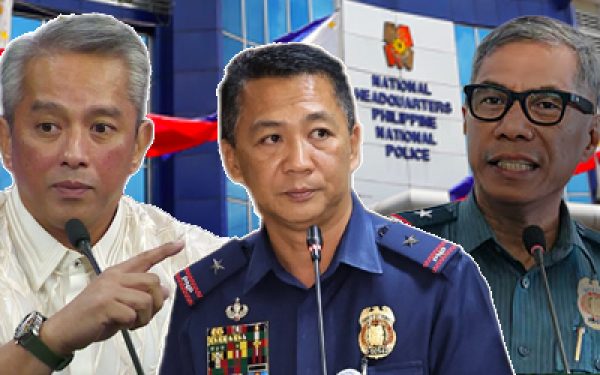According to a relief order dated August 25, 2025 and signed by the Executive Secretary, the order takes effect immediately. Torre has also been instructed to ensure the proper turnover of all matters, documents, and information related to his office.
Malacañang did not provide a reason for Torre’s removal, but the Secretary of the Interior and Local Government stated that one of the considerations of President Ferdinand “Bongbong” Marcos Jr. was Torre’s reassignment of high-ranking PNP officials without approval from the president, the Department of the Interior and Local Government (DILG), and the National Police Commission (Napolcom).
“That among other things, is part of the consideration of the President,” the Secretary said.
Lt. Gen. Jose Melencio Nartatez Jr., one of the PNP officials reassigned by Torre to Mindanao, will serve as the PNP Officer-in-Charge. The reshuffle carried out by Torre was later invalidated by Napolcom through an issued memorandum.
The Secretary mentioned that although the decision to remove Torre was difficult, the President deemed it necessary because he believes that the “national security apparatus must always work within the framework of the law.”
“With the recent developments, the President must be presented with the facts and he determined that the best course of action is to uphold the role of Napolcom as it was intended by law,” according to the DILG chief.
A senator stated that Torre’s reshuffle of high-ranking PNP officials was improper.
“P/Gen. Nicolas Torre III acted ‘beyond his authority’ by unilaterally relieving his second-in-command, P/Lt. Gen. Jose Melencio Nartatez Jr.,” the senator said.
“Normally, the designation (and relief) of the members of the PNP Command Group—Deputy for Administration, Deputy for Operations, and Chief of Directorial Staff—should be cleared with the President or at least the ex-officio chairman of the National Police Commission (Napolcom), and the secretary of the Interior and Local Government,” he added.
Torre, who assumed the position on June 2, was the 31st PNP chief. He was the first Philippine National Police Academy graduate to lead the national police force.
Torre previously served as chief of the Criminal Investigation and Detection Group, where he led the arrest of former President Rodrigo “Digong” Duterte at the Ninoy Aquino International Airport in March.
He also led the capture of Kingdom of Jesus Christ founder Apollo Quiboloy on September 8, 2024, in Davao City while serving as chief of Police Regional Office 11.
Malacañang
Malacañang Palace is the official residence and principal workplace of the President of the Philippines. Originally built in 1750 as a Spanish nobleman’s summer house, it was later seized by the colonial government and became the governor-general’s residence. It has served as the symbolic center of Philippine political power and history for over two centuries.
Philippine National Police (PNP)
The Philippine National Police (PNP) is the national police force of the Philippines, established in its current form in 1991 under the Republic Act 6975. It was created by merging the Philippine Constabulary and the Integrated National Police to form a unified civilian agency responsible for law enforcement and maintaining peace and order across the country.
Department of the Interior and Local Government (DILG)
The Department of the Interior and Local Government (DILG) is the executive department of the Philippine government responsible for promoting peace and order, ensuring public safety, and strengthening the capabilities of local government units. It traces its origins to the Philippine Revolution of 1897 and has evolved through various forms, including the Department of Interior, to its current structure established after the 1986 People Power Revolution. Its mandate is to assist the President in the general supervision of local governments and to ensure the accountability of public officials.
National Police Commission (Napolcom)
The National Police Commission (Napolcom) is the central administrative body for the Philippine National Police (PNP). It was formally established under the 1987 Constitution and the 1991 Republic Act 6975 to ensure civilian oversight of the national police force. Its primary mandates include administering the police service, overseeing its policies, and processing appointments within the PNP.
Mindanao
Mindanao is the second-largest island in the Philippines, known for its rich cultural diversity and stunning natural landscapes. Its history is marked by a blend of indigenous traditions, Islamic sultanates that predate Spanish colonization, and a complex modern history of migration and conflict. The island is also home to Mount Apo, the country’s highest peak, and a vibrant array of ethnic groups.
Criminal Investigation and Detection Group
The Criminal Investigation and Detection Group (CIDG) is a premier investigative unit of the Philippine National Police (PNP). It was originally established in 1944 as the Philippine Constabulary’s Criminal Investigation Service (CIS) to handle major and complex crimes. Today, it is responsible for investigating organized and transnational crimes, as well as high-profile cases in the Philippines.
Ninoy Aquino International Airport
Ninoy Aquino International Airport (NAIA) is the primary international gateway serving the Manila area in the Philippines. It was originally named Manila International Airport but was renamed in 1987 in honor of Benigno “Ninoy” Aquino Jr., a senator whose assassination on its tarmac in 1983 was a pivotal event that led to the People Power Revolution. Today, it is one of the busiest airports in Southeast Asia.
Police Regional Office 11
The Police Regional Office 11, also known as PRO 11 or the Davao Region Police, is a regional command of the Philippine National Police (PNP). It was established to maintain peace, order, and public safety within the Davao Region in Mindanao. Its history is tied to the evolution of the national police force, operating under the PNP’s organizational reforms that began after the 1986 People Power Revolution.



